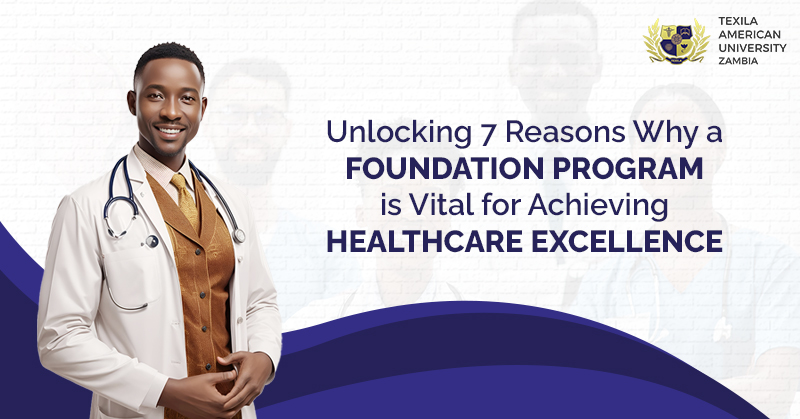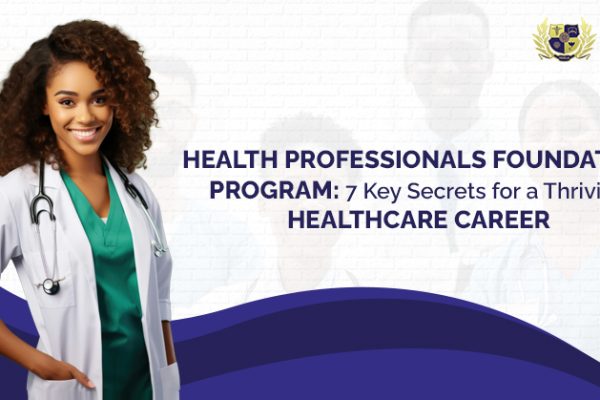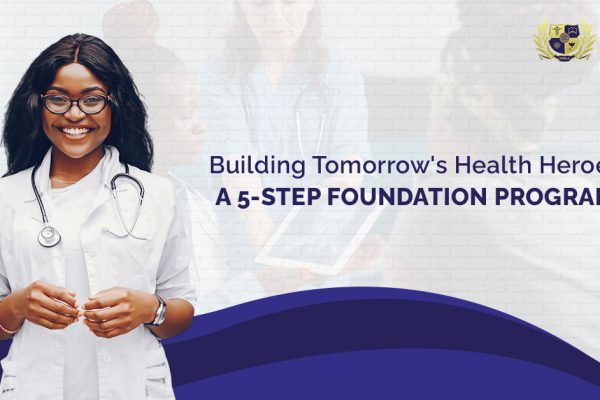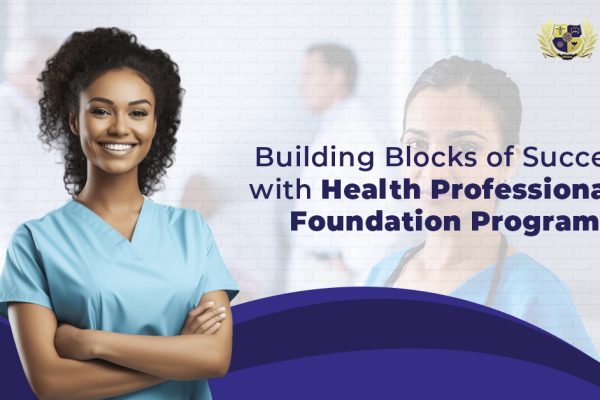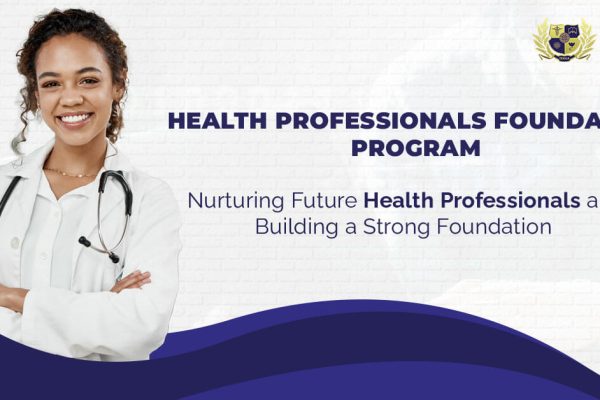|
Tired of Reading? Please listen to the blog
|
Blog Summary
In healthcare, Foundation Programs serve as indispensable gateways to success. These comprehensive initiatives bridge the transition from secondary education to specialized healthcare training, equipping aspiring practitioners with essential knowledge, skills, and attitudes. From academic preparation to clinical exposure, these programs lay a sturdy foundation for future healthcare professionals. Through seven compelling reasons, this summary explores the transformative impact of Foundation Programs, highlighting their role in shaping successful healthcare careers. By fostering professionalism, enhancing skills, and broadening horizons, these programs pave the way for excellence in healthcare practice.
- I. Introduction
- II. Bridging the Gap: Understanding the Health Professionals Foundation Program
- III. Establishing Strong Fundamentals: 7 Reasons Why a Foundation Program is Crucial
- IV. Case Studies and Success Stories
- VI. Challenges and Solutions
- VII. Future Outlook and Recommendations
- VIII. Conclusion
- FAQs
I. Introduction
The foundation upon which professionals build their careers is critical in the ever-evolving healthcare landscape. The cornerstone is a Health Professionals Foundation Program, which gives prospective healthcare practitioners the knowledge, abilities, and mindsets they need to succeed. This article delves into the significance of such programs, elucidating seven compelling reasons why they are indispensable for achieving excellence in healthcare.
II. Bridging the Gap: Understanding the Health Professionals Foundation Program
A Health Professionals Foundation Program is a comprehensive educational initiative to bridge the transition from secondary education to specialized healthcare training. It targets individuals aspiring to pursue careers in medicine, nursing, allied health professions, and related fields. Typically spanning one to two years, these programs offer a structured curriculum encompassing fundamental sciences, clinical skills, and professional development modules. Accredited by relevant regulatory bodies, these programs ensure that participants meet the prerequisites for further studies in healthcare disciplines.
III. Establishing Strong Fundamentals: 7 Reasons Why a Foundation Program is Crucial
1. Academic Preparation for Medical Degrees:
Laying the Groundwork for Success Foundation programs are the cornerstone for aspiring medical professionals pursuing degrees like MBChB. These programs meticulously structure their curriculum to provide participants with the necessary prerequisites and foundational knowledge crucial for navigating the complexities of medical studies. Biology, chemistry, and physics are extensively covered, laying a robust groundwork for participants to build their future medical knowledge and expertise.
2. Exposure to Core Healthcare Concepts:
Broadening Perspectives Comprehensive coursework within foundation programs goes beyond theoretical learning, offering participants a panoramic view of core healthcare disciplines. By delving into these disciplines, participants grasp fundamental concepts and familiarize themselves with the terminologies intrinsic to the healthcare domain. This exposure fosters a holistic understanding of healthcare, promoting interdisciplinary thinking essential for addressing multifaceted health challenges in their future careers.
3. Development of Essential Skills:
Nurturing Holistic Competence In addition to academic excellence, foundation programs prioritize cultivating essential skills vital for success in the healthcare landscape. Through interactive learning activities, simulations, and practical experiences, participants refine crucial skills such as communication, teamwork, and problem-solving. This holistic approach ensures that future healthcare professionals are adept in medical knowledge and the interpersonal and analytical skills necessary for effective patient care and collaboration within interdisciplinary teams.
4. Building Professionalism and Ethical Standards:
Upholding Integrity in Practice Ethical conduct and professionalism form the bedrock of ethical healthcare provision, and foundation programs spare no effort in instilling these values in their participants. Modules dedicated to medical ethics, patient confidentiality, and professional boundaries are meticulously crafted to imbue students with a deep sense of responsibility and compassion towards their future patients. By internalizing these principles early on, participants are primed to uphold the highest standards of integrity and ethical practice throughout their careers.
5. Preparation for Clinical Practice:
Bridging Theory with Real-World Experience One of the distinguishing features of foundation programs is their emphasis on providing early exposure to clinical settings. This hands-on experience allows participants to acclimate themselves to the dynamics of healthcare environments and familiarize themselves with basic clinical procedures. Such exposure not only demystifies the clinical realm but also cultivates confidence and competence, laying a solid foundation for the rigorous demands of clinical practice in their subsequent studies and professional endeavours.
6. Enhanced Academic Performance:
Flourishing Through Foundational Knowledge The comprehensive preparation provided by foundation programs often translates into enhanced academic performance in subsequent studies. With a solid foundation in healthcare sciences and essential skills, participants are better equipped to navigate the challenges of medical degree programs with confidence and proficiency. This academic advantage fosters personal growth and contributes to better outcomes in examinations and clinical assessments, setting the stage for a successful career in medicine.
7. Increased Career Opportunities:
Unlocking Versatile Pathways Completion of a health professional’s education opens many doors to diverse healthcare career pathways. Whether participants choose to further their studies in medicine, nursing, or allied health professions or venture into avenues such as research or public health, they are equipped with a versatile skill set that enhances their employability and career prospects. The interdisciplinary nature of foundation programs ensures that graduates are well-prepared to adapt to the evolving landscape of healthcare and contribute meaningfully to their chosen field.
IV. Case Studies and Success Stories
Through testimonials and success stories, the transformative impact of Health Professionals Foundation Programs becomes apparent. Graduates share anecdotes of how these programs equipped them with the necessary foundation to excel in their healthcare professions. From overcoming academic challenges to thriving in clinical settings, these narratives underscore the invaluable role of foundation programs in shaping successful healthcare careers.
VI. Challenges and Solutions
Despite their myriad benefits, participants of health professional education courses may encounter challenges such as academic rigour, time management, or adapting to new learning environments. Institutions offering these programs provide support services such as tutoring, counselling, and academic advising to assist students in overcoming these challenges and maximizing their learning experience.
VII. Future Outlook and Recommendations
As healthcare evolves, so too must Health Professionals Foundation Programs. Continuous innovation in curriculum design, teaching methodologies, and assessment strategies is crucial to ensure these programs remain relevant and effective in preparing the next generation of healthcare professionals. Collaboration between educational institutions, healthcare providers, and regulatory bodies is essential to identify emerging needs and implement enhancements accordingly.
VIII. Conclusion
In conclusion, a Health Professionals Foundation Program serves as a vital steppingstone towards achieving excellence in healthcare. By providing participants with a solid academic foundation, essential skills, and early exposure to clinical practice, these programs empower aspiring healthcare professionals to embark on fulfilling and impactful careers.

